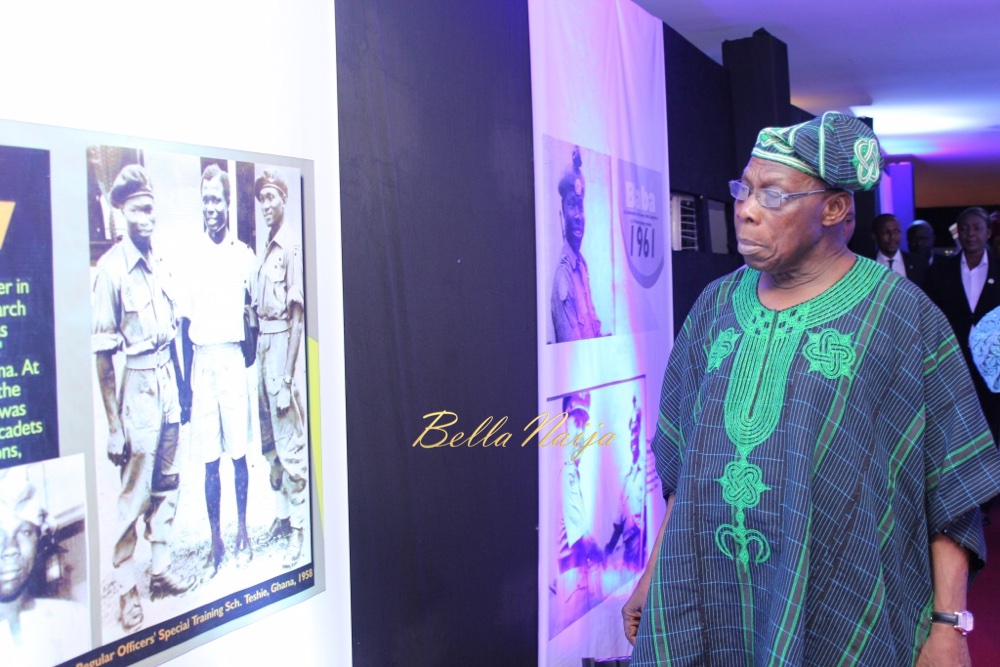The Enigma Of A Man Called Olusegun Obasanjo At 80
Posted on March 31, 2017
BY GODKNOWS IGALI

Hurray! At last our oga, Chief Olusegun Obasanjo, who even the aged prefer to call Baba – a typical African sobriquet for a father, an oldman or a sage – is now officially at least 80!
In celebration and thanksgiving a gigantean line-up of activities climaxing on Saturday, March 5th and Sunday 6th, 2017 as countless world leaders joined Nigeria’s acting President, Prof. Yemi Osinbajo in Abeokuta to open the very impressionate Obasanjo Presidential Library.
Perhaps compared to its kind in other parts of the world, the Obasanjo Presidential Library stands in a special class of its own. Apart from the ultramodern facilities for research and intellectual discourse on national, regional and global issues, the library has the most picturesque of setting. The library complex includes the best of recreational facilities for all ages set in an ambience of conscious environmental footprint, sporting facilities, religious places of worship, a world-class hotel, a business centre, events center, etc. Indeed, the Obansanjo Presidential Library is the cynosure of what Africans can do given the will and determination.
Obasanjo joining this vaunted age reverberates a reflection on the life stories of some of the greatest men and women in history. These have mostly been that of triumphs and tempests, successes, and search for succour and not the least, a rendition of a puzzles, paradoxes and perplexities. It is not that the greatest of human beings were the most endowed in terms of mental acumen or physical formation or of the noblest of birth and social ascription. On the contrary, some like Alexander the Great were men whose physical appearance were on the less impressive side.
Indeed, Simon Bolivar “the liberator” who in the early 1800s wrested independence from Spanish colonial rule before he attained the age of 35 years for six countries – Mexico, Panama, Venezuela, Ecualor, Peru and Bolivar, was an orphan and of brevity of physical form. Even in our generation, we see quite few great persons of that genre.
Many great men are therefore either born into backgrounds of little economic means, humble social status, sometimes, absence of the basic necessities of life or even threats to actual existence. But even more than that, is the fact that their actual lives are anthologies of triumph over a number of contradictory circumstances. American 16th President, Lincoln went through the most tempestuous of times which included the loss of his beloved wife and children and other greatly humbling situations. Though Abraham Lincoln and his earlier predecessor and 3rd American President, Thomas Jefferson were both slaveholders at the time, they nonetheless would take up the gauntlet to fight their contemporaries against slavery and slave trade and became reputed as greatest of Presidents against all odds of life.
The story of King David, one of the epical heroes in Christianity, Islam and Judaism and indeed, world history and the study of literature is not different. Yet, this philosopher King who is remembered with praises, gallants and euphemistic adulations is full of opposite inversions and logical incompatibilities. At several times, he was a victim, yet, in the eyes of his mentor King Saul he was considered a virulent, ambitious rival. At other times, he was an impulsive sexual predator, but amazingly, he was one described by God as “the man after my heart” and so the rest of the story goes. In the same way, the iconic Nelson Mandela is interesting enough a man of great life challenges in his personal life. Having gone through the heartache of divorce at least on three occasions and even loss of two of his adult children including one to HIV/AIDS and another to drunk driving. Above all, he was thrown into jail for 27 years for no just cause! Yet his life was one of the greatest gifts to humanity and is an epitome of divine compassion and dispassion.
Of all these situations of contradistinction juxtaposed in the lives of great men, one that stands out is that of the man, Olusegun Matthew Aremu Okikeola Obasanjo. As is said in Spanish “por fin”, we now know that at least eighty years ago, on a market day likely on 5th March, 1937, a male child was born to a peasant farmer in Ibogun area of the South-West Nigerian town of Abeokuta. In a rather prophetic and futuristic prediction, his parents named him Olusegun which means “God is ever victorious”. This obviously was with a hope that the plan of God will express itself supremely in the life of the bouncing male child and that emboldened them to place on him the typical tribal marks of his Owu lineage; a trademark which he carries for the rest of his life.
The journey towards upward progression for Obasanjo interpesed with many other great men and women who equally originate or were born in this town, Abeokuta, about the same time as him. These include the musical maestro, Fela Anikolapo (1938), Nobel laureate Wole Soyinka (1934), former Interim President of Nigeria – Ernest Shonekan (1936), former President candidate and business mogul – Moshood Abiola (1937), International Jurist and diplomat Prince Bola Ajibola (1934), and finiancial and development expert, Dr. Onaolapo Soleye (1935), Dr. Bola Kuforiji Olubi (1936), etc. Since the periodization of dates of births and precedence in some cases is an issue, we will not hazard a guess as to who comes first. But one sure fact is that the youn[g Olusegun had to climb the ladder wherever he found himself with many of these other contemporaries through the dint of hardwork and not because of the privilege of births like some of them, say Prince Bola Ajibola who was the son of a King.
The young Olusegun excelled particularly in the Sciences, Mathematics, Physics, Chemistry and all stages of his study especially at Baptist Boys’ High School. It was therefore not surprising that he proceeded to Yaba College, the only tertiary institution at the time besides University College, Ibadan, to study and graduated as a Civil Engineer. But rather than focus on constructing roads and bridges in the then Public Works Department (PWD), this strong-headed young man from Owu proceeded to join the Nigerian Army in 1958 as a member of the First Regular Course. He subsequently received his further training in some of the elitist military institutions around the world including the Royal School of Military Survey, the Royal School of Military Engineering and British Royal Engineers Young Officers School all in the United Kingdom and also the Indian School of Engineering.
From 1959, after completion of his formal military training and commissioned as a Second Lieutenant, he entered into active service attached to British battalions in England and Germany and soon found himself in 1961 serving the world as United Nations Peace Keeper in Congo (now Zaire Republic). Although his academic training was in the Sciences, his entry into the army brought him under infantry where he remained until he was promoted to Captain in 1963 and moved to head the Engineering Corps as Commander. In his book “Nzeogwu, (1998)” he recounts his nervating and breath taking experiences especially in the Congo and the days after his bosom friend, Chukwuma Nzeogwu found himself as the mastermind of the 1966 military coup. Obasanjo’s fealty to the relationship with Nzeogwu even after the latter’s death was similar to the Biblical account of David and Jonathan! True, this he maintains with many who come his way in life.
Obasanjo’s exploits during the Nigerian Civil War including his take over of the infamous Third Marine Commando from “the Black Scorpion”, Col. Benjamin Adekunle, was a crowning crest in his military service. While in Port Harcourt, he led federal troops to bring about the final defeat of rebel forces which led to eventual surrender and the hand over of the instruments of armistice to him by Gen. Philip Effiong, the then Chief of Staff of the Biafran Army in January, 1970.
Still in military uniform, he later held various command positions in the Nigerian Army finally serving as Commissioner of Works. Following the overthrow of Gen. Yakubu Gowon as the Head of State in 1975 and he became Chief of Staff and Second in Command to Gen Murtala Muhammed, the new Head of State. On the latter’s assassination in 1976, Obasanjo was elected by his peers in the Supreme Military Council to assume the mantle of leadership as Head of State, a position which we hear he accepted reluctantly.
Under his watch as a Military Head of State, his policies were mostly liberal and focused. Without bothering into details, he established the Nigerian National Petroleum Corporation in 1977 to manage the country’s new found wealth – “Petrol-Dollar”, and in that same year, organised the Second World Black and African Festival of Arts and Culture better known as FESTAC 77. With a knack for perfection and excellence, he also established the Corrupt Practices Bureau and established a robust agricultural program called Operation Feed the Nation. It was Obasanjo who threw a rigorous diplomatic engagement at continental and international levels to ensure the attainment of independence for Angola and later Zimbabwe.
Indeed, Obasanjo ensured the realization of the dream which he had with Gen. Murtala Muhammed to promulgate the law which led to the building of a new federal capital in Abuja and laid its foundation stone. The pinnacle of his career as a military-politician was the fact that he superintended the free and democratic elections and ensured the handover of power to Alhaji Shehu Shagari in 1978. This was first of its kind in the days of military hold unto power in Africa. His pellucid reflections on his military career and taste of power are in his voluminous but controversial book “My Command” (2006).
Obasanjo’s retirement period was spent not in his home town of Abeokuta, but in the nearby farming community of Otta where he established the farm estate and African Leadership Forum. This was a high profile academic outfit which dealt with critical issues of research on policy and strategy on governance and economic development. He also devoted his time to personal diplomacy along with his good friends around the world including 40th United States President, Jimmy Carter, Nelson Mandela, former German Chancellor, Helmut Shmidt, former Japanese Prime Minister, Takeo Fukuda and Swedish Prime Minister, Olof Palme. Along with them in 1983, he established what became known as the inter-Active Council which is a concert of former Heads of States and several other bodies.
During the period, he also released a number of books, including “Africa in Perspective”, (1987), “Forging A Compact in US-African Relations” (1988). He also tried unsuccessfully to become Security General of the United Nations; but like the sully role of the proverbial termite, his efforts were thwarted by forces within his homefront.
It was during this period that he was accused of working against the interest of the government of the day and was sentenced to death serving good time at Kirikiri, Nigerian Maximum Security Prison with some of the most hardened criminals in 1996. By the time Obasanjo came out of prison, he had written a political satire entitled “The Animal Called Man” reflecting on the complexities of human existence. A devout and staunch Christian faithful, his prison years also produced another 235-encyclopaedic masterpiece underlying his conviction “Guidelines to Effective Prayers”. Later in life, he is reputed to have built the Aso Villa Christian Chapel, The National Christian Centre (Ecumenical Centre, 2005) and went to study theology, obtaining a Masters’ Degree in 2016 and is currently undergoing his Doctorate! What a man.
For a man that had been on death row, it was only clear that God’s purpose, as was presaged in his name, was not finished when the power brokers of the day decided that he should be the Presidential candidate of the new party which they formed called People’s Democratic Party (PDP). Rustic and penniless, obviously disenchanted, he came out of Kirikiri prison and after electoral victory, moved straight to Aso Rock Presidential Villa. This same place from where his death sentence was pronounced and he ruled Nigerian for eight straight years. He also became the architect of the Nigeria we see today, a modern democratic country with the foundation for greatness and a secured place in global affairs.
The chronicle of the achievements of Obasanjo during this 8 years would itself be the subject of a total anthology of its own. It suffices to mention that far reaching economic and social reforms in almost all sectors of national economy were undertaken. These include initiative on agriculture which are still being followed today such as programs on local rice production, on cassava and other stable crops, the industrial master plan of the country and massive reforms in the power sector including the commencement of the 10 Nigeria Integrated Power Projects (NIPP) and the unbundling of the infamous NEPA.
It was to his great credit that he worked assiduoudly towards Nigeria’s historic debt relief of $18million from the Paris Club in June, 2015. Another great achievement was in telecommunication where he introduced the GSM and thereby increased Nigeria’s tele-density from 2million to the present 100million connectivity. A feat never seen before anywhere in the world.
It was also Obasanjo who established all the existing anti-corruption agencies including Code of Conduct Bureau and its Tribunal, the Economic and Financial Crimes Commission (EFCC) and the Independent Corrupt Practices Commission (ICPC). Also, he recognised the lingering problem of the Niger Delta and re-enacted the spirit of the 1958 Willinks Commission by establishing the Niger Delta Development Commission (NDDC) in 2005 as a special development agency. He therefore pushed to ensure that one from the troubled region, Goodluck Ebele Jonathan, became Vice President and subsequently, President.
In his vision to see that Nigeria’s private sector took over the African business landscape, he took every scrupulous measure to begin to build the budding entrepreneurial class into key global players. Did he succeed? Of course and that is why we have today Aliko Dangote, Tony Elumelu, Jim Ovia, Mike Adenuga, Emeka Offor and many others who are contributing quietly both in Nigeria and around the world.
There are few people, living or dead, who understand Nigeria as Obasanjo – a detribalized Nigeria and a man who had gone through great pains, betrayals and backstabbing, yet, he is one that forgives almost like an infant child.
Although some question marks arose as to the handling of the civil crisis in Odi, Bayelsa State and Zaki-Biam, Benue state or on the unsuccessful “third term bid”, his time in governance was perhaps a golden age for Nigeria.
Exaggerated dirges, eulogies and odes are often said at funerals of persons, but in this case, we hold it true and fortunately some of his contemporaries are still alive to say that Olusegun stood out at every stage of his military training whether in Nigeria or abroad or throughout his public service. Of course, he knew where he was coming from and had to work extra hard which has become now habitual and compulsive preoccupation. He is also adverse to running away from controversies as long as his convictions and instincts are right. He therefore remains unrepentantly controversial with polarities of opinions about his personal and public life. Three years ago, I recall asking him to take it easy on his birthday and he rebuff politely “as long as God has given me strength, I will keep going on”.
From what we all saw at Abeokuta, this bubbling old man will obviously go on still for many years to come and perhaps at 80 should be given more work to do.
Godknows Igali, PhD is an Administrator, award-winning author, and diplomat.






